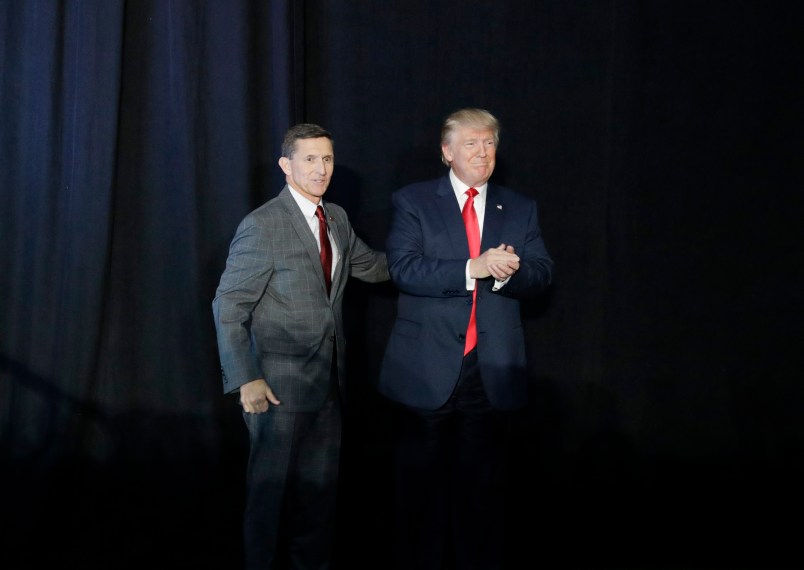On this weekend’s back and forth on who Mike Flynn lied to, who knew he’d lied and why it might matter, let’s step back for a moment. With regards to Flynn lying to the FBI we’re now looking at the narrow factual question of whether Acting Attorney General Sally Yates told White House Counsel Don McGahn that Flynn had lied to the FBI; whether McGahn told Trump; and whether Trump knew this in the intervening days before he fired Flynn when he asked James Comey to drop the investigation. We are collectively running through this chain of connections because of our semi-reasonable but likely outmoded tendency to take the various claims we’ve heard from the White House at face value: especially the claim that Flynn was fired for lying to Vice President Pence, etc.
However, if we step back and collect together the information we now know, particularly the presumably hard evidence of statements included in Flynn’s plea agreement, it’s pretty clear none of these things even matter.
Let’s walk through the key issues.
On January 12th David Ignatius reported in The Washington Post that Flynn had talked to Ambassador Kislyak about sanctions on December 29th. This led to a flurry of denials: first that the call had taken place at all and then that the calls had been about anything more than pleasantries. Vice President Pence vouched publicly for these denials on multiple occasions, supposedly based on Flynn lying to him about what he discussed with Kislyak.
We now know that during the multiple calls Flynn had with Kislyak in the last days of December he not only notified his colleagues but actively solicited and received their input in real time. As the Flynn plea agreement lays out, Flynn called KT McFarland at Mar-a-Lago to discuss the sanctions calls with her. She in turn solicited the opinions of other senior transition officials with her to share with Flynn. Contemporaneous records suggest these officials, who go unnamed in the plea document, included Stephen Miller, Kellyanne Conway, Steve Bannon and Reince Priebus. Concluding the series of calls with Kislyak on December 31st, Flynn again called into Mar-a-Lago and spoke not only to McFarland but directly to “senior members of the Presidential Transition Team” about the sanctions calls.
What this tells us is that the nature of Flynn’s calls, specifically that they dealt with sanctions, were known widely among Trump’s top advisors: McFarland, Conway, Bannon, Miller, Priebus and certainly others. Given this fact it is hard to believe that Trump and Pence didn’t know the details as well. Even if Trump and Pence didn’t know (as unlikely as that may be), each of those people knew as soon as Pence gave his public assurances that these assurances were false.
Again, note: This is not speculation. This is not based on journalistic accounts. It’s based on the Flynn plea agreement and contemporaneous pool reports which detailed which top advisors the transition team said were with the President on the days in question handling the foreign policy transition.
Pence told Fox’s Chris Wallace on January 15th that Flynn and Kislyak “did not discuss anything having to do with the United States’ decision to expel diplomats or impose censure against Russia.” This came after unnamed Trump transition officials had assured multiple news organizations of the same thing. So every day from January 15th to February 13th, when Flynn was fired, most or all of Trump’s top advisors knew Flynn’s claim was false. So this was a transition-wide deception and a knowing deception. Lying to Pence was basically irrelevant. It likely didn’t happen. But if it didn’t it was compounded by most top advisors being part of the same deception.
We do not yet have specific evidence that Pence and Trump knew this was false on January 15th. But it strains credulity to believe that they didn’t then and indeed at the end of December.
What does that all mean? Certainly it means that the ‘he fired because he lied to Pence” explanation for Flynn’s firing was bogus. Why? Because the whole senior staff knew these claims were false and let the falsehood stand for weeks. It also makes it very likely that the whole discussion about just when Yates said this and McGahn said that is meaningless since Trump and Pence likely knew all of this more than a month before Flynn was fired. Flynn was very tight with Trump. I think it’s highly unlikely that Trump didn’t know Flynn was interviewed on the day in question. It’s likely they discussed it. They were talking all the time.
In any case, continuing to discuss this question on the basis of the ‘Flynn lied to Pence’ canard or when Sally Yates brought the news to the White House just means we’re trying to understand what happened within the framework of what we now know are lies.
We shouldn’t. Trump’s top advisors knew the true nature of the calls and repeatedly lied about it to reporters. This is the only plausible read of the the current evidence. They allowed Pence’s false statements to stand for weeks, which amounts to a furtherance of those lies.
We’re simply not dealing with something the key people found out in late January. This was a cover-up, a string of publicly verified deceptions that went back to the beginning of the month.






